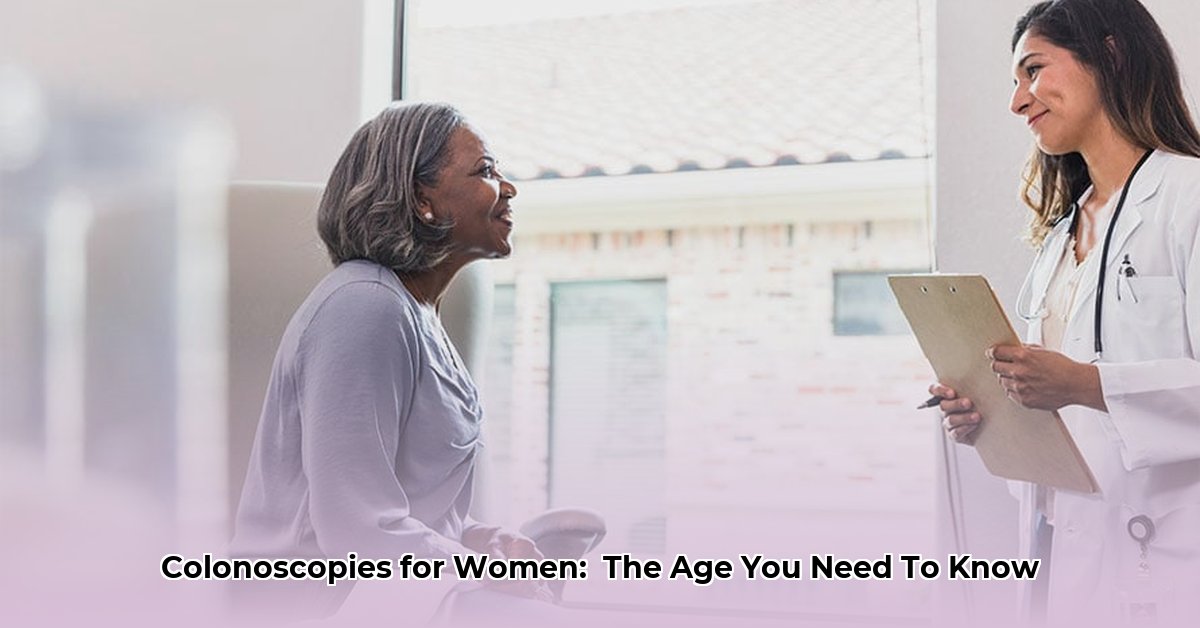Turning 45? It’s a big birthday, and for women, it’s a reminder to prioritize their gut health. This article is your comprehensive guide to colonoscopies – that important screening test for colorectal cancer. We’ll present everything you need to know in clear, accessible language, from defining what a colonoscopy is and underscoring its importance to explaining how to prepare and what to anticipate. We’ll cover the benefits and potential downsides, address common concerns, and empower you to make informed decisions about your health. Let’s get you informed and ready to protect your gut!
Colonoscopies for Women: Your Questions Answered
Understanding Colorectal Cancer Screening: A Must for Women’s Health
Colorectal cancer affects both men and women, making it essential for women to understand their screening options. Colorectal cancer is the third most common cancer diagnosed in both men and women in the United States. Colonoscopies are a highly effective tool for early detection and prevention, significantly improving a woman’s chances of a positive outcome. Yes, women absolutely do get colonoscopies! Regular check-ups are crucial for maintaining optimal colon health.
Demystifying the Colonoscopy: What Happens During the Procedure?
Let’s describe colonoscopies simply. During this procedure, a doctor inserts a thin, flexible tube with a tiny camera into your rectum, gently guiding it through your colon. This provides a clear view of your entire large intestine. The colonoscope allows the doctor to examine the lining of the colon for any abnormalities, such as polyps, ulcers, or tumors. If needed, they can take a small tissue sample (a biopsy) or even remove polyps during the procedure, with you comfortably sedated. Preparation involves dietary adjustments and a bowel cleanse in the days leading up to the procedure to ensure a clear view of the colon. While it might sound intense, many women find it much less bothersome than anticipated.
The Benefits of Colonoscopies: Why Should You Consider One?
Early detection is paramount in successfully treating colorectal cancer. Colonoscopies excel in this. They can identify – and often remove – precancerous growths called polyps before they develop into cancer. Studies consistently demonstrate that regular colonoscopies significantly reduce the risk of developing and dying from colorectal cancer. It’s similar to routine car maintenance—preventative care for your gut. The American Cancer Society estimates that colonoscopies can reduce the risk of colorectal cancer by up to 60%.
Potential Risks: Understanding Colonoscopy Safety
As with any medical procedure, colonoscopies carry a small risk of complications. These might include minor bleeding, a tear in the bowel (perforation), or an infection. However, these occurrences are rare. For most women, the benefits significantly outweigh these risks. Your doctor will discuss any potential concerns with you in detail before scheduling your appointment.
When Should Women Get Colonoscopies? Understanding Screening Guidelines
Current guidelines recommend that women at average risk should begin colorectal cancer screenings at age 45. This recommendation is based on extensive research demonstrating a significant decrease in cases and deaths when screening starts at a younger age. Women with a family history of colorectal cancer or other risk factors, such as inflammatory bowel disease, may need to begin screening earlier or undergo more frequent screenings. Consulting your doctor is essential to determine the most appropriate screening schedule for you.
Finding the Right Doctor: Locating a Gastroenterologist
Finding a gastroenterologist (a doctor specializing in the digestive system) is generally straightforward. Your primary care physician can offer a recommendation, or you can conduct an online search. Scheduling an appointment is usually as simple as a phone call or an online request. The preparation involves following specific instructions (provided by your doctor’s office) regarding dietary restrictions and bowel-cleansing solutions in the days leading up to your procedure.
The Colonoscopy Experience: What Happens During and After?
During the procedure, you’ll receive medication to help you relax and sleep comfortably. The colonoscopy itself proceeds quickly. Most women report experiencing only mild pressure. Following the procedure, some mild cramping or bloating is possible but typically subsides rapidly. Your doctor will provide comprehensive aftercare instructions to ensure a comfortable recovery.
Colonoscopy FAQs: Addressing Common Questions
Is the prep really that bad? The bowel prep can be inconvenient, but it’s manageable, with various options available. Your doctor can help you find a prep solution best suited to your lifestyle.
Will it hurt? You’ll be sedated to ensure your comfort. Most women describe any sensations as mild pressure rather than pain.
How often will I need a colonoscopy? It depends on your individual risk factors and the results of your initial colonoscopy. Screenings might be recommended every 10 years or more frequently, depending on your specific needs. Your doctor will provide personalized guidance.
Taking Action for Your Health: Schedule Your Colonoscopy Screening
Colonoscopies are a crucial component of preventative healthcare for women. It’s natural to have concerns about a medical procedure, but open communication with your doctor can alleviate any anxiety. Take control of your health by scheduling your screening today. Early detection saves lives, offering invaluable peace of mind.
Overcoming Colonoscopy Prep Challenges: Expert Tips for Women
Key Takeaways:
- The female anatomy can present unique challenges during colonoscopy preparation and the procedure itself.
- Thorough bowel preparation is crucial for a successful exam, minimizing the need for repeat procedures.
- Open communication with your gastroenterologist is vital, including discussing prior surgeries, anxieties, and preferences for sedation.
Understanding the Challenges: Addressing Twist and Turns
Colonoscopy prep isn’t always pleasant. For women, it can present additional challenges. Our colons are often longer and more complex than men’s, making the procedure potentially longer and slightly more uncomfortable. Previous surgeries, such as C-sections or hysterectomies, can further complicate matters. However, understanding these factors and having a plan can make all the difference.
Conquering the Colonoscopy Prep Phase: A Step-by-Step Guide
Excellent bowel prep is essential for a successful colonoscopy, ensuring a clear view for your doctor. Here’s how to navigate prep challenges:
Step 1: Open Communication with Your Doctor. Share your medical history, including past surgeries, and discuss any anxieties you may have. Ask about alternative prep options.
Step 2: Meticulous Adherence to Instructions. Follow your doctor’s instructions precisely, including dietary restrictions and bowel cleansing solutions.
Step 3: Prioritize Hydration. Drink ample clear liquids throughout the prep phase to stay hydrated and aid in flushing your system.
Step 4: Plan Ahead for Success. Prepare easily digestible foods for the clear liquid diet and schedule time off work or childcare to manage potential fatigue.
During and After the Colonoscopy: Expectation and Recovery
The procedure typically involves sedation, making it relatively painless. Post-procedure, you’ll likely experience some gas and bloating, which usually subsides within a day or two. Your doctor will provide detailed recovery guidance.
Addressing Specific Concerns: Anxiety and Pain Management
- Anxiety: Pre-procedure anxiety is common. Consider relaxation techniques and discuss your concerns with your doctor or a therapist.
- Pain: While sedation minimizes pain, some discomfort is possible. Discuss pain relief options with your doctor.
- Previous Surgeries: Inform your gastroenterologist about any prior abdominal surgeries to allow for adjustments to their approach.
Remember, early detection of colorectal cancer saves lives. A colonoscopy is an investment in your long-term health. Don’t let prep challenges deter you. By following these steps and maintaining open communication with your physician, you can take control of your health.
Colonoscopy Prep for Women Over 45: A Comprehensive Health Guide
Key Takeaways:
- Colonoscopies are vital for early colorectal cancer detection in women 45 and older.
- Proper preparation is crucial for a successful and comfortable procedure.
- Understanding the process reduces anxiety and promotes better health outcomes.
Why a Colonoscopy? Prioritizing Preventative Screening
Colorectal cancer poses a significant health risk, but early detection significantly improves survival rates. Regular screenings are paramount for women. A colonoscopy allows your doctor to directly examine your entire colon, effectively identifying and removing precancerous polyps before they become cancerous.
This preventative measure can be compared to a thorough car inspection—catching small problems early prevents major breakdowns later.
When Should You Undergo a Colonoscopy? Understanding Screening Recommendations
The current recommendation is for women to begin regular colonoscopy screenings at age 45, assuming average risk. However, your doctor may recommend earlier testing if you have a family history of colorectal cancer, inflammatory bowel disease (IBD), or other risk factors. It’s essential to discuss your specific situation with your healthcare provider.
Dietary and Bowel Prep: What to Expect
Preparation is crucial for a clear view during the procedure. Your doctor will provide detailed instructions, but generally, you’ll need to follow a specific diet and bowel-cleansing regimen.
- Glass Lid Storage Containers Keep Food Fresh and Safe - January 19, 2026
- Borosilicate Glass Storage Delivers Durability and Safety for Meals - January 18, 2026
- Best Meal Prep Containers for Fresh and Organized Meals - January 18, 2026










